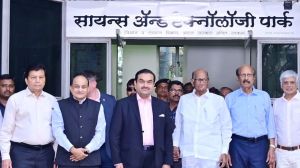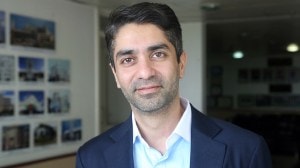George-speak
Does George Fernandes know something no one else in the government knows? Is the Defence Minister speaking unguardedly and prematurely or ...

Does George Fernandes know something no one else in the government knows? Is the Defence Minister speaking unguardedly and prematurely or simply stating the facts? Is he being misunderstood and misquoted? One of the Vajpayee government8217;s more memorable contributions to political life is George-speak, the Defence Minister8217;s assertions which confuse the public and tie up the government in knots, assertions explained away as the rhetorical flourishes of a politician who was once a charismatic trade union leader. Whatever it is, George Fernandes has been making interesting pronouncements on the Comprehensive Test Ban Treaty in Tokyo.
It would be nice to believe, as he told the Japanese Foreign Minister, that India is going to sign the CTBT in the not too distant future. It would be a bold step, would boost India8217;s credibility abroad and put a major arms control treaty back on track. Such an Indian initiative would be widely welcomed and is essential at a critical time in world affairs when the arms race isbeing revived in the east and the west.
But, of course, it is much too soon to raise anyone8217;s hopes. There has been no hint of progress on the test ban treaty at home. In fact, members of the Vajpayee government rarely even discuss it these days; the subject tends to come up only when 8220;foreign interlocutors8221; raise it. If true that it is only a matter of time before India signs, the government seems to have missed an excellent opportunity to inform Parliament about it during the just-concluded session. And confusingly, the official position remains exactly what it was before.
India is inching towards the CTBT but has not got there yet. As spelled out carefully by a Ministry of External Affairs spokesperson, a voluntary moratorium on testing is being observed and the government is 8220;trying to build a broad-based consensus on the test ban treaty before signing it8221;. 8220;Trying8221; is the operative word. It means the outcome could go either way. The conclusion must be that there is a mile-wide gap between Fernandes and the MEA. Such is the double-talk on the CTBT which leaves the Indian public completely in the dark about the government8217;s intentions and moves.
Those against the CTBT on technical grounds will be much encouraged in their opposition by reports, utterly absurd and lacking in substance though they are, like one from a US television network which says Pakistan8217;s nuclear arsenal is superior to India8217;s. It will not be forgotten how the arms race between the US and the Soviet Union, not to mention the profits of weapons manufacturers, were boosted during the Cold War by just such preposterous intelligence assessments. It was only years and expenditures of billions of dollars later that the inaccuracy of those assessments was revealed.
Bogeys are easy to create. The difficult thing for governments is keeping a clear head and their priorities straight. It is no good getting sidetracked by imaginary threats and fears. The CTBT should be kept in focus as a desirable means of limiting the development of nuclear weapons internationally. George Fernandes is right to suggest that India ought to breath new life into the treaty soon.
- 011 day ago
- 021 day ago
- 031 day ago
- 041 day ago
- 058 hours ago































